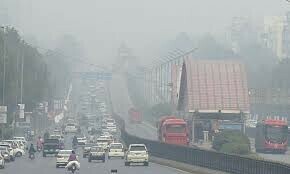ISLAMABAD: Dust and emissions from vehicles in the capital worsened air quality on Friday, making it ‘very unhealthy’ on Friday, said Pakistan Environmental Protection Agency (Pak-EPA).
As a result, the Air Quality Index (AQI) reached 217 micrograms per cubic metre on average.
The AQI indicates the current level of air pollution and its potential impact on health.
It helps individuals make informed decisions regarding outdoor activities based on air quality forecasts.
From noon till 8pm, AQI was the highest on Friday, reaching 227 micrograms per cubic metre (ug/m3) on average with particulate matter (PM) 2.5 reaching 177 ug per cubic metre. This was significantly higher than the permissible National Environmental Quality Standards (NEQS) of 35 micrograms per cubic metre.
Air quality in the capital continued to deteriorate, with sources pointing to emissions from outdated brick kilns on the city’s outskirts that have not yet adopted environmentally friendly zigzag technology. Additionally, pollution from neighbouring Rawalpindi was adding to the increasing levels of PM 2.5 particulate matter in the air, posing a health risk to Islamabad’s residents.
According to Director Labs/National Environmental Quality Standards (NEQS) Pakistan Environmental Protection Agency (Pak-EPA) Dr Zaigham Abbas, PM 2.5 made up 90pc of air pollution.
PM 2.5, or fine particulate matter, is a type of air pollution that is considered the most harmful to humans because it can be inhaled deep into the lungs and bloodstream.
Last week, Pak-EPA warned that children, elderly and patients of asthma must wear masks when stepping into the open after the federal capital’s air became vastly polluted with AQI reaching 187 microgram per cubic metre.
Talking to Dawn, Dr Zaigham Abbas said in a recent meeting with the Capital Development Authority chairman, inspector general police Islamabad, and Pak-EPA among other stakeholders, the administration decided on taking decisive actions to control dust and vehicular emissions in the federal capital.
“CDA chairman, who is also the chief commissioner Islamabad, directed that first information report (FIR) be registered against individuals for open burning of waste, brick kilns and vehicles emitting smoke,” Dr Abbas said. He said directions were also given to check emissions from heavy vehicles at three entry points in Islamabad — Tarnol, Bhara Kahu and Faizabad.
The meeting also decided to utilise the 3,300 safe city cameras installed across the city to check burning of waste and vehicular emissions and to impose fines immediately, Dr Zaigham said. The chief commissioner also emphasised ensuring vehicular fitness, focusing on controlling emissions such as smoke, carbon monoxide and noise from vehicles.
Published in Dawn, November 16th, 2024







